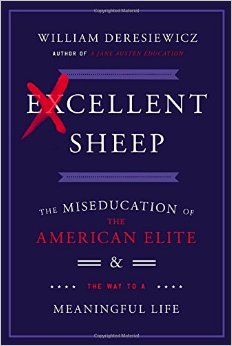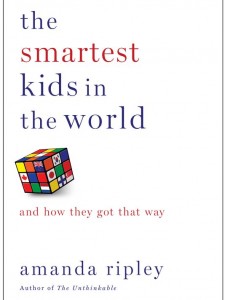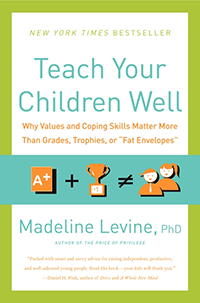As the school year approaches, it’s good to take a moment and think about the point at which our individual and collective educational efforts are aimed. The race to get into the ‘right’ schools is all encompassing at each step along the path – pre-school, elementary, middle school, high school and college (and beyond). It’s easy to get caught up in the immediate pursuit and take our eyes off the prize…
…which is a well-adjusted and productive child who reaches his or her potential and finds his or her place in the world.
The goal can’t be merely be to get into Harvard — because it’s increasingly difficult for even the finest students to do this. The goal is to open a child’s mind and help them find both what they’re good at… and what they love. The tools necessary to be successful in these critical life categories include perseverance in the face of failure, willingness to take risks, and knowledge of self enough to determine a path to happiness.

Several books have just come out that address how we’re doing at educating our kids in the US. There’s a tremendous media frenzy surrounding William Deresiewicz’s “Excellent Sheep: The Miseducation of the American Elite and the Way to a Meaningful Life.” The author, a former Yale professor, claims that Ivy League students are so programmed to be perfect (spending all their energy jumping through the hoops of tests and resume building) that they perform like “excellent sheep” in college and get dumped into traditional money-making careers without adequate exploration of the self or questioning of the system. Excellent counter-arguments to his thesis abound right now (the best being The New Yorker’s Nathan Heller in a recent article “Poison Ivy” — which is required reading if you are tempted by Deresiewicz’s argument).
Another new title provides compelling reading about how other cultures approach education. “The Smartest Kids in the World and How They Got That Way” is powerfully written by Amanda Ripley and follows three American kids who each spent a year in the most successful school systems in the world — South Korea, Finland and Poland. Her real-life stories track ground breaking research on the most successful classrooms around the world and Ripley analyzes how they reached these high marks. The comparison to how we do things in the US is jaw-dropping. Put simply, each of the three cultures place much more importance on education than we do in the US, and the proof is in the pudding. A prioritization on academic performance is written into the DNA of their students, who are measurably more committed to their own academic rigor and performance than are American kids. The South Korean kids literally live at school (sleeping during class is the norm) and are tutored late into each evening in preparation for a single all-important test that determines their career path. Finish kids have laser-like focus on their school work, but don’t sweat outside the classroom, and traipse about the world unencumbered by parental oversight. (There are no helicopter parents in Finland). The two examples represent polar extremes, and neither could be duplicated easily here, but Ripley presents a hopeful view for US students if only because the three most successful nations have transformed their educational systems within the past few decades.
As for how to operate in the here and now, our next book will be Madeline Levine’s “Teach Your Children Well.” Stay tuned for our thoughts!



